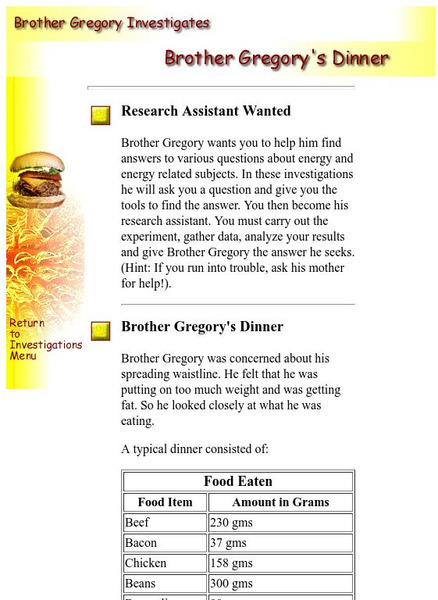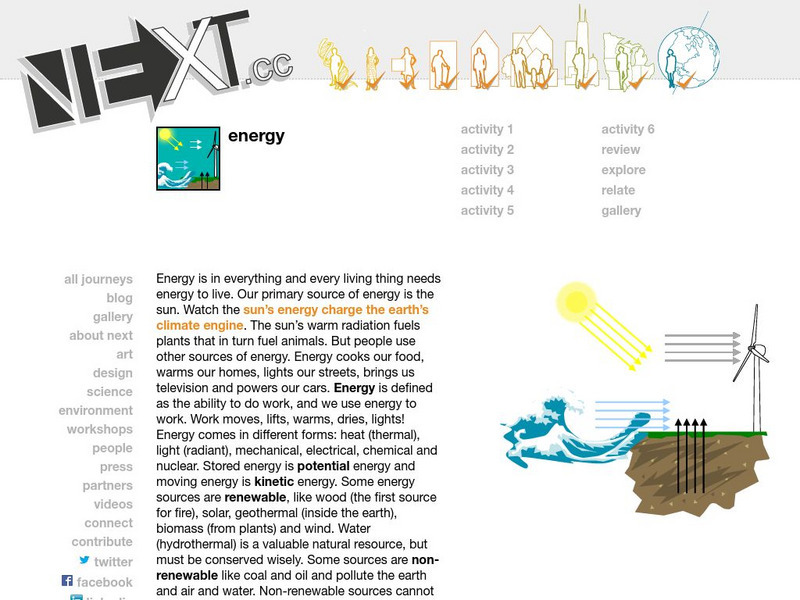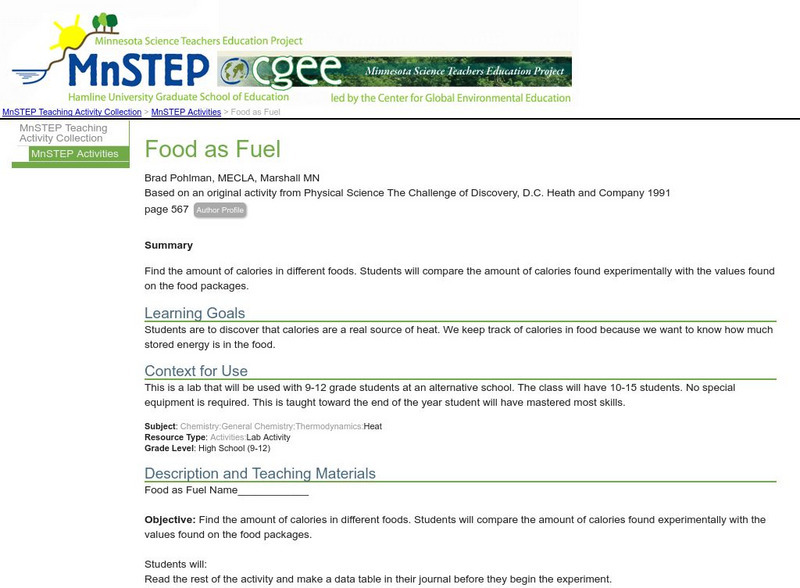Hi, what do you want to do?
University of Georgia
Energy Content of Foods
Why do athletes load up on carbohydrates the evening before a competition? The instructional activity helps answer this question as it relates the type of food to the amount of energy it contains. After a discussion, scholars...
NASA
Consumers Get Energy From Other Living Things
How do plants and animals get their food? Learn about where energy comes from, how animals store energy, and aerobic respiration, in a instructional activity that allows scholars to diagram energy flows.
Virginia Department of Education
Freshwater Food Chains
What's in the water? Encourage your class to further explore this question and learn about pond ecosystems, food chains, and food webs as they complete this hands-on activity. They view the environment from a new perspective...
Howard Hughes Medical Institute
Milk—How Sweet Is It?
Have you ever wondered why some people are lactose intolerant? Participants test simulated patients in a hands-on lab activity to find out! They learn about lactose intolerance by performing an experiment, analyzing data, and drawing...
Biology in Motion
ATP and Energy Storage
Young children often appear to have endless amounts of energy. The interactive describes where energy comes from and how bodies turn food into a usable energy source. The comparison of ATP to a rechargeable battery helps pupils remember...
Serendip
How Do Biological Organisms Use Energy?
When an organism eats, how does food become energy? Young biologists follow glucose through the process of cellular respiration to the creation of ADP using a discussion-based activity. The resource also highlights conservation of mass...
Howard Hughes Medical Institute
How the Body Uses Fat
Not all fat is bad—eating good fats actually helps with weight loss. Learn how the body uses fat through a 27-slide presentation that breaks down the path fat takes from entering to exiting the body. Understanding why fat is helpful and...
Kenan Fellows
How Much Energy Is That Anyway?
The fifth lesson plan in the six part series introduces units of energy including calories, Calories, and joules. Scholars determine the energy released when eating a snack and during activity.
Teach Engineering
Cellular Respiration and Bioremediation
You can breathe easily now that you've found a winning resource. Young biologists learn about the process of cellular respiration, primarily through teacher-led discussion and instruction. They also consider the concept of...
Science Matters
Peanut Energy
How do humans get energy since they aren't mechanical and can't photosynthesize? Learners explore this question by relating potential energy in food to human energy levels. Scholars measure the change in mass and a change in...
Cooking Matters
Happy Whole-idays
Take a look into how whole grains support growth, provide energy to play, and help us to stay strong with a fun-filled resource. The worksheet offers interesting food facts, an exercise in nutrition label reading, a recipe...
University of California
Energy and Biomass Pyramids
Young scientists play tag as they act out the food pyramid in the ocean ecosystem. Energy circles pass from the smaller prey to the predators and at the end of the activity, a data chart and analysis questions allow pupils to apply their...
Curated OER
An Introduction to Nutrition
Whether you need a new textbook for your health class, or a few exercises and passages for your lesson on nutrition, you'll find what you need with a thorough nutritional science resource. With 15 chapters that cover elements of...
Curated OER
Math in Science-Knowing the Calories You Take In!
I can burn off one scrambled egg in 30 minutes of walking? Explain how we daily consume and burn calories using this fun instructional activity, which breaks down basic foods and activities into kilocalorie equivalents. Nutritionists...
Curated OER
Measuring Calories
Learners burn peanuts and marshmallows to determine the calories each contains. In this calorimetry lesson, students set up an apparatus with a ring stand and water in an aluminum can. They record the temperature of the water before and...
Curated OER
Calories and Nutrition
In this calories worksheet, students use a chart comparing the calories found in different food items to complete 3 short answer questions.
Curated OER
Food Energy
Students compare the energy value of traditional foods eaten by indigenous people with those of modern commercial foods. They use a calorimeter to measure and calculate the amount of stored energy in various food types, and identify the...
Curated OER
Carbohydrates
For this carbohydrates worksheet, students review the six groups of nutrients needed for the human body. Students focus on sugars and carbohydrates, the sources of these nutrients and how the body uses these nutrients. This worksheet has...
Curated OER
Food Energy and Nutrients
For this food energy and nutrients worksheet, students fill in the blank and complete a chart with information about food energy and essential nutrients needed for the body. Using the Nelson text, students complete a chart about...
Curated OER
Eat Smart. Play Hard.
Students study healthy food choices and the energy it creates for physical activity. In this food energy activity, students complete multiple activities to learn about the benefits of healthy eating upon physical activity.
Curated OER
How Do Living Things Get Energy?
In this living things worksheet, students complete a graphic organizer by writing in 1 main idea and 2 supporting details about how living things get energy.
City University of New York
Brother Gregory's Dinner: Food Energy Content
Use a virtual calorimeter to investigate the energy content of various foods. The background information is clear and easy to understand.
Next.cc
Next: Energy
Multiple activities explore and explain the different forms of energy, the ability to do work.
Science Education Resource Center at Carleton College
Serc: Food as Fuel
Students find and compare the amount of calories found experimentally with the values found on the food packages.




























